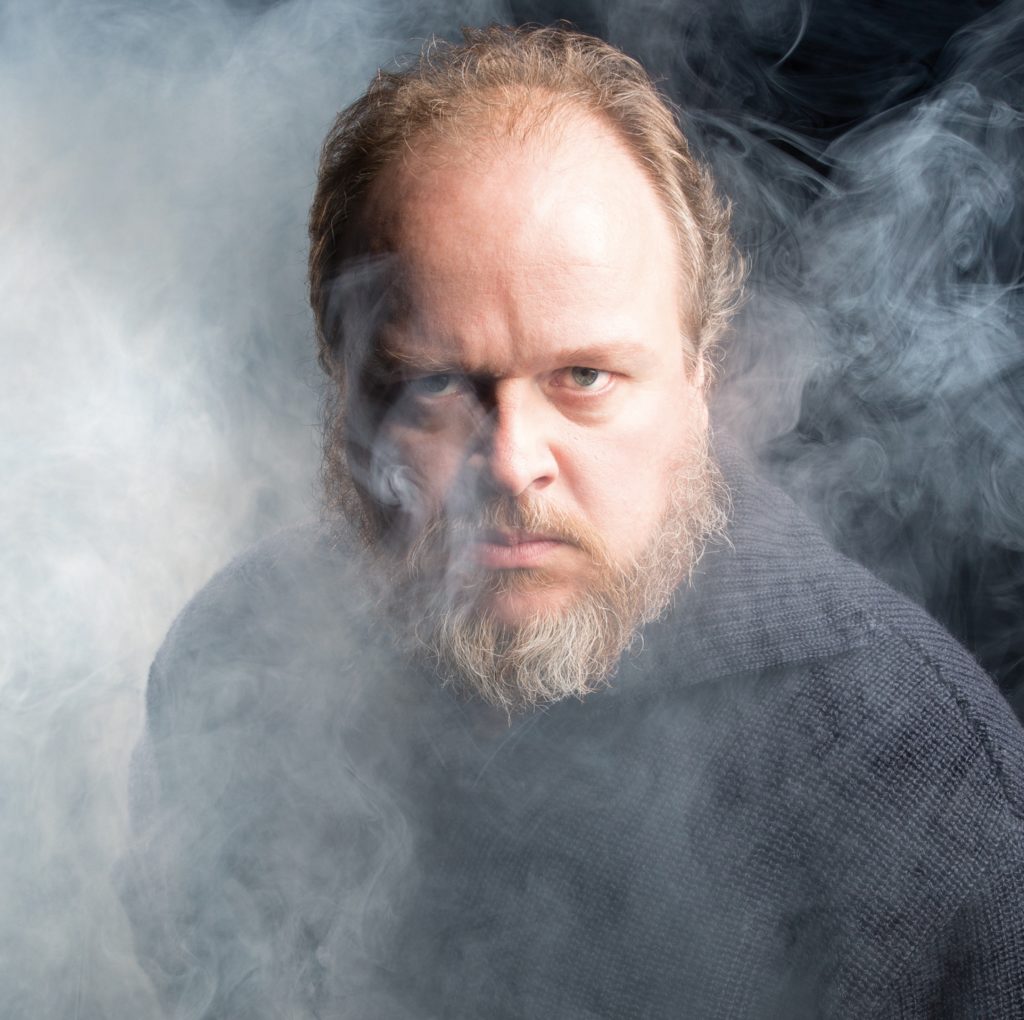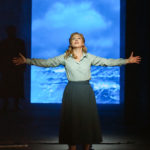 A new production at Vienna Volksoper of Wagner’s Der fliegende Holländer, Volksoper the home of Operetta, and Vienna’s second opera house. But from the Overture, even as a regular, I hadn’t expected such thrilling playing: top-notch woodwind, fiery brass, seductive strings; swept away on a glorious wave of orchestral swagger, Volksoper orchestra under Marc Piollet.
A new production at Vienna Volksoper of Wagner’s Der fliegende Holländer, Volksoper the home of Operetta, and Vienna’s second opera house. But from the Overture, even as a regular, I hadn’t expected such thrilling playing: top-notch woodwind, fiery brass, seductive strings; swept away on a glorious wave of orchestral swagger, Volksoper orchestra under Marc Piollet.
I’d expected ‘modern’ staging: Daland (Andreas Mitschke’s) Norwegian captain- his ship blown off-course – is at his desk; the ‘chorus’ of sailors, behind shipping crates. Mitschke’s Daland, grey-haired, in a long seaman’s coat, his bass resonates authority. Also impressive is his helmsman, Steuermann, his ‘boy’, who nervously pours his captain’s liquor. Brinkman, with a soft, beautiful tenor, sings of the storm keeping him away from his woman. Oh, dear south wind blow– absolutely exquisite, Brinkman a real find- and we hear it blow!
 The stage set turns to reveal- out of the blue, or purple haze- the Dutchman (Der Holländer.) Marcus Marquardt’s grisly, bearded figure -as if blown from hell- looks every inch the Holländer, the captain of the Flying Dutchman, cursed by the devil to sail the high seas forever. Die Frist ist um; once every seven years, allowed to go ashore, to find the woman who’s true love will redeem him. Marquardt’s seasoned bass/baritone pleads with the fates. Nirgend ein Grab. No grave; no death. What unholy grave? But he has one forlorn hope: the Day of Judgement. When all the dead are raised. Nichts vergehen, eternal destruction. He raises his hands: DOOM.
The stage set turns to reveal- out of the blue, or purple haze- the Dutchman (Der Holländer.) Marcus Marquardt’s grisly, bearded figure -as if blown from hell- looks every inch the Holländer, the captain of the Flying Dutchman, cursed by the devil to sail the high seas forever. Die Frist ist um; once every seven years, allowed to go ashore, to find the woman who’s true love will redeem him. Marquardt’s seasoned bass/baritone pleads with the fates. Nirgend ein Grab. No grave; no death. What unholy grave? But he has one forlorn hope: the Day of Judgement. When all the dead are raised. Nichts vergehen, eternal destruction. He raises his hands: DOOM.
The sets (Franz Phillip Schlossmann)- minimalist, functional -are panels of grey marble effect. Daland rebukes his Steuermann. Was he asleep? He saw nothing of the ghostly ship (blown by the storm into harbour.)
In the confrontation of the two captains – high drama- the Dutchman reveals he’s come from afar. How long? He doesn’t count the years anymore. Has no homeland; neither wife or child. But seeks ‘shelter for one night’, offering his ship with costly treasures as security: all his wealth for a new homeland here. These treasures- what price? -asks Daland. Have you a daughter? – His daughter Senta, the most valuable of his possessions, in this patriarchal marriage contract. South wind blow!. Thunder and storms are nothing to these sailors, Volksoper Chorus sing with terrific gusto.
By contrast (Act 2), what appears a ladies’ choir in high-school uniforms, (supposed to be in Daland’s house waiting for the seamen to return.) Senta, Kristiane Kaiser’s blonde, wears a blazer and blue skirt.  The women’s choir is in impressive voice, led by Mary, Martina Mikelik’s stunning contralto. Senta, alone, self-absorbed, sings the ballad of the Flying Dutchman and his terrible fate. She fantasises it could be her destiny to be the woman to release him from his curse. She sings of herself as God’s Angel, as if in a state of ecstasy, Kaiser attaining a surprisingly high top note.
The women’s choir is in impressive voice, led by Mary, Martina Mikelik’s stunning contralto. Senta, alone, self-absorbed, sings the ballad of the Flying Dutchman and his terrible fate. She fantasises it could be her destiny to be the woman to release him from his curse. She sings of herself as God’s Angel, as if in a state of ecstasy, Kaiser attaining a surprisingly high top note.
More down to earth is her scene with Erik, the farmer/huntsman she’s betrothed to, sung by Vincent Schirrmacher- looking very dashing in riding boots – who reminds her of her pledge and her duty. His heart is true to her, Schirrmacher sings with an Italianate passion, while she clutches a painting of a ship which- symbolically- he tries to pull away from her. Why is she frightened, it was only a dream, he reassures her. Schirrmacher, always beautiful to hear, but is he perhaps too light a tenor for the role?
Senta’s a pawn in the patriarchal pact. Her father suddenly appears. Kaiser stands as if star-struck. No greeting for him?- Who is the stranger? The Dutchman der Holländer, stands in a doorway, irradiated in a brilliant white light. Tremendously effective staging (Aron Stiehl’s direction.) Daland asks if it would put her out if the seaman lives with them. Would she be tied to him as his bride? – Still no word!- Kaiser is under a spell. Daland, leaving them, takes away a gold attache case.
Kaiser, in profile, reminds of a film noir movie star. She has an icy beauty. Her scene encountering the Holländer is remarkable. She sings of how, out of a remote, distant past, she had been drawn to him. He sings of feeling himself released from his hell. He stands before her in a gust of passion: how she always imagined him. He sings of her as his salvation. This is a tremendous scene. Kaiser surpasses herself, with searing high notes, against Marquardt’s, gruff, yet smooth, gravelly bass. Then, referring to her father’s pledge, will he find life-long peace with her?
They are both standing impassioned- their hands raised out- but not yet touching. He imputes her ‘virginity’. She, abruptly, her heart is true: pure until death! He sings, he has been reprieved from his hell. It’s as if their relationship is not quite earthbound. What a revelation! Kaiser, usually in less vocally demanding operetta roles, rises to the challenge of a Wagner heroine. And with Marquardt, distinguished in Wagnerian roles (Amfortas in Parsifal,2018, Wotan for Thielemann 2017.) Daland enters; he asks whether they are to be wed, his question superfluous.
That marvellous, swaggering, seafarers’ tune, opening Act 3, Helmsman leave your watch. (Brinkman appears asleep front of stage). Kipp und Sturm lassen wir aus. Steuermann komm und trink mit uns!. The stage is divided between sailors carousing behind their barricades (pictures of the sea), and the women on the shore, as if celebrating in a hen party, like sailors’ wives, beer bottles in hand. (Modern dress? Timeless, free from fashion.)
In the plot, the sailors invite the crew of the Dutchman to drink with them. But there’s no answer. They’re pale, white-faced, ghostly – not red-blooded, and rugged. The women, in disbelief, pass their bottles around. Kipp und Sturm. The stage is now immersed under an eerie red light. Daland’s sailors approach – standing at the edge of stage- as if looking out to sea: they appear to see the spectre of the fliegender Holländer. In a state of awe and terror. Terrific staging and choreography.
In an extended, but dreary scene- the only low, for me – Erik complains of her deception. She’s breaking her vow to be faithful. Oh, Senta, leugnest du. Good, but Schirrmacher, I repeat, isn’t really ideal for this role. Too effusive, declamatory, the wrong romanticism?  Kaiser stands, looking away, in another world. Verloren, heil. Lost, in a state of suspended salvation.
Kaiser stands, looking away, in another world. Verloren, heil. Lost, in a state of suspended salvation.
Marquardt’s Holländer approaches, overhearing them. He thinks he’s being betrayed, his hopes disillusioned. Anchors away! He announces the contract is annulled. He releases her from her vows, hoping to save her from death. He’s accursed; his salvation is in eternity, Mein Heil in Ewigkeit .
But Senta insists she is true to him, faithful until death treu bist Tod.. Unbelievable, soaring high notes from Kaiser. She, in a trance, Kaiser as if sleepwalking towards the Dutchman’s ship: images of the sea – rear of stage – lit up under a cool, eerie moonlight.
You won’t see a better Dutchman in Vienna, Vienna State Opera’s (Mielitz) staging more elaborate, Volksoper’s more intimate. But it depends, of course, on the cast and conductor. Tonight’s cast and chorus were heroic, the orchestral playing inspired by Wagner’s muse. My love and fascination for this earlier Wagner- yet a masterpiece – increases with each viewing. © PR. 12 3.2019
Photos: Markus Marquardt (Der Holländer) © Johannes Ifkovits
Markus Marquardt as the Holländer; Meagan Miller(Senta), Chorus of Vienna Volksoper; Kristiane Kaiser (Senta);Featured image Stefan Cerny, JunHo You, Volksoper Chorus © Barbara Pálffy/ Volksoper Wien
viennaoperareview.com
Vienna's English opera blog

I’m not that much of a online reader to be honest
but your blogs really nice, keep it up! I’ll go ahead and bookmark
your website to come back down the road. Many thanks
Hello my friend! I wish to say that this post is awesome, nicely written. like to see more posts like this.
amazing post